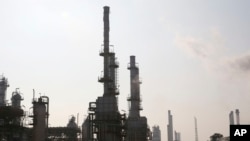Arab media report that relations between Iran and Syria have taken a turn for the worse after Tehran stopped providing subsidized petroleum products to Damascus. Repeated Israeli attacks on pro-Iranian militia forces are also leading Tehran and its militia allies to question whether some Syrian military commanders aren't informing Israel about their movements.
A drone strike in late January on a pro-Iranian militia truck convoy near the Syrian-Iraqi border appears to have made both Iran and Syria nervous about their strategic relations, after some reports claimed that Syrian sources have been giving Israel information about Iranian weapons shipments inside Syria.
London-based Syrian analyst Ramy Abdel Rahman told Arab media that Iran and its Hezbollah and Iraqi militia allies acted quickly to make changes to the personnel at the Boukamel border post between Syria and Iraq and near pro-Iranian militia positions after the Israeli attack. It was not clear if the changes included Syrian government forces. Abdel Rahman argues that Syrians were not involved in giving information to Israel.
He says that his information is that there are those working for Israel and that Hezbollah is aware of it, but they are Lebanese and Iranians, rather than Syrians. The movements of the pro-Iranian forces are being telegraphed to the U.S. and Israel. The fact that some convoys are passing unscathed while others are not, he says, points to information coming from inside Iran about what the convoys are carrying.
The Saudi-owned Asharq Alawsat newspaper claimed in an article last week (Saturday, January 28, 2023) that relations between Tehran and Damascus are tense due to Iranian concerns that Syrian sources might be providing Israel with information about movements by Iran and its allies inside Syria.
Joshua Landis, who heads the Middle East studies program at the University of Oklahoma, tells VOA that many Syrians, including some in the military, are not pleased about Iran's behavior inside their country, and many are worried about those attacks destroying morale in President Bashar al-Assad's forces. Nevertheless, he thinks that tensions between Tehran and Damascus are unlikely to cause any serious breach between the two allies.
"I would hate to exaggerate the tensions, although they are very real tensions because Iran and Syria are connected at the hip and so is Hezbollah, and in many ways, Iran has been successful in its last 10 years of effort to consolidate its grip both in Iraq, in Syria and in Lebanon," said Landis.
Landis stresses that Iran's decision to stop selling subsidized petroleum to Syria has aggravated an already serious economic crisis inside Syria and is "making people extremely unhappy" and leaving "no foreseeable way to get out of the downward spiral."
"Tensions have only gotten worse," he argues, "as sanctions against both Russia and Iran and military pressure on Iran with the latest strike (on an Iranian convoy near the Boukamel border post) makes it look like things are going to go from bad to worse in Syria and raise tensions in all the relationships."
Khattar Abou Diab, who teaches political science at the University of Paris, tells VOA that Iran "is Syria's main benefactor since 2011, providing the bulk of aid to President Assad's government," getting in return economic and political influence, including "an interest in economic assets like government land and buildings, and natural resources like phosphate mines." Iran, he adds, "has changed the face of Syria and its main cities, including Damascus, Aleppo and Homs."
Abou Diab argues that despite friction between the two countries, including a canceled visit by Iranian President Ebrahim Raisi in December, cooperation remains strong.
He says talk of problems between the two governments is exaggerated because Syrian Defense Minister Ali Abbas recently visited Iran, reaching agreements to strengthen electronic and intelligence ties in addition to installing a new anti-air defense system outside Damascus. Iran, he says, is still the main powerbroker inside Syria, despite claims by Russia to have more clout.
London-based Iran analyst Mehrdad Khonsari tells VOA that Iran's cutback in aid to Syria is due to Iranian money being "blocked by the continuing stalemate over reviving the 2015 JCPOA," making Tehran unable to allocate resources to Syria. The Iranian Revolutionary Guard, he argues, "would like to revive the nuclear deal so it can make use of some of its resources in places like Syria."
Khonsari is skeptical, however, about a serious rift between Tehran and Damascus.
"Who can Assad trust more than the Iranians?" he asks. "It may not be an ideal situation right now," he says, "but if you look at the past 10 or 15 years, Iran has been the most reliable partner that he's had."




